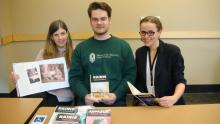The Latvian National Commition for UNESCO and the Latvian Language Agency in Rīga together with Latvia’s Ministry of Culture are organizing a competition titled ”Found in Translation-Rainis and Aspazija”. In honor of the 150th anniversary of the birth of both poets, 2015 has been declared ”Rainis and Aspazijas” year in Latvia.Participating in the ”Found in Translation – Rainis and Aspazija” competition will be five Baltic Studies program students currently studying Latvian at the Scandinavian Department of the University of Washington. One of these five students will be awarded the main prize – a free trip to Latvia in December. The Latvian National Commition for UNESCO will publish the best translations and present all of the prize winners from foreign universities a special cultural program during their visit to Latvia.Rainis and Aspazija are Latvian writers and public figures of European and global scale. Both they and their creative work were the benchmark for Latvian literature, public and political opinion for more than 100 years, contribution of the poets, especially Rainis’, still plays a significant role in the development of philosophical thought. Rainis’ concept of the “Man of the Future” is especially topical in light of UNESCO’s work on the post-2015 agenda unlocking the potential of culture as a driving force for sustainable development. With special attention devoted to education, Rainis formulated that the “Man of the Future” has to become an educator, a role model to others. Moreover, he placed special emphasis on the empowerment of culture, reminding us that the “Man of the Future” is rooted in the common history and heritage of its people. For this reason each nation can build their future successfully only when respecting their cultural heritage and placing it in the heart of development. Aspazija was an extraordinary phenomena in Latvian culture. She came onto the Latvian social and literary scene with new and poetic social ideas, challenging the provincialism of Latvia at that time and asserting the role of women as powerful individuals equal to men.The”Found in Translation - Rainis and Aspazija” competition has two goals: to remember the spiritual heritage of Rainis and Aspazija and to create new translations of their works in various world languages. Becoming familiar with the works of these two poets will allow students to reflect on issues that were important more than 100 years ago and over the years have not lost their importance, i.e. the equality of women, independent thought, and creativity.
